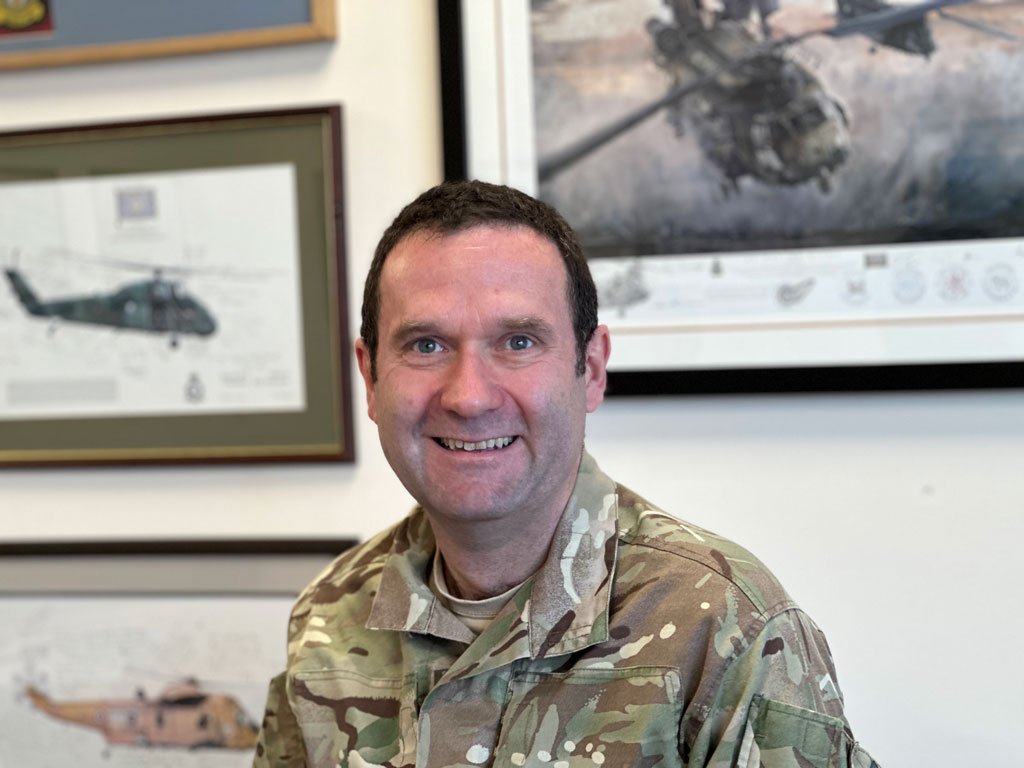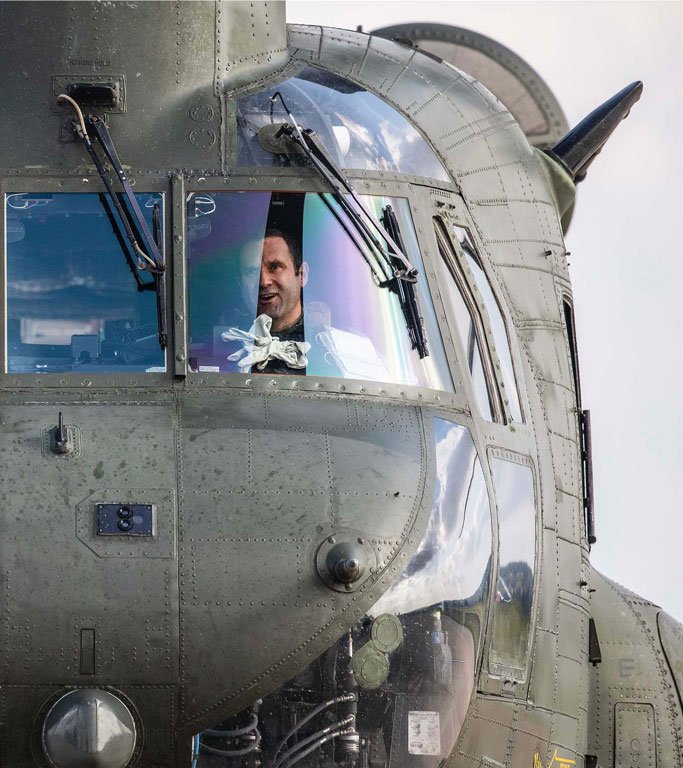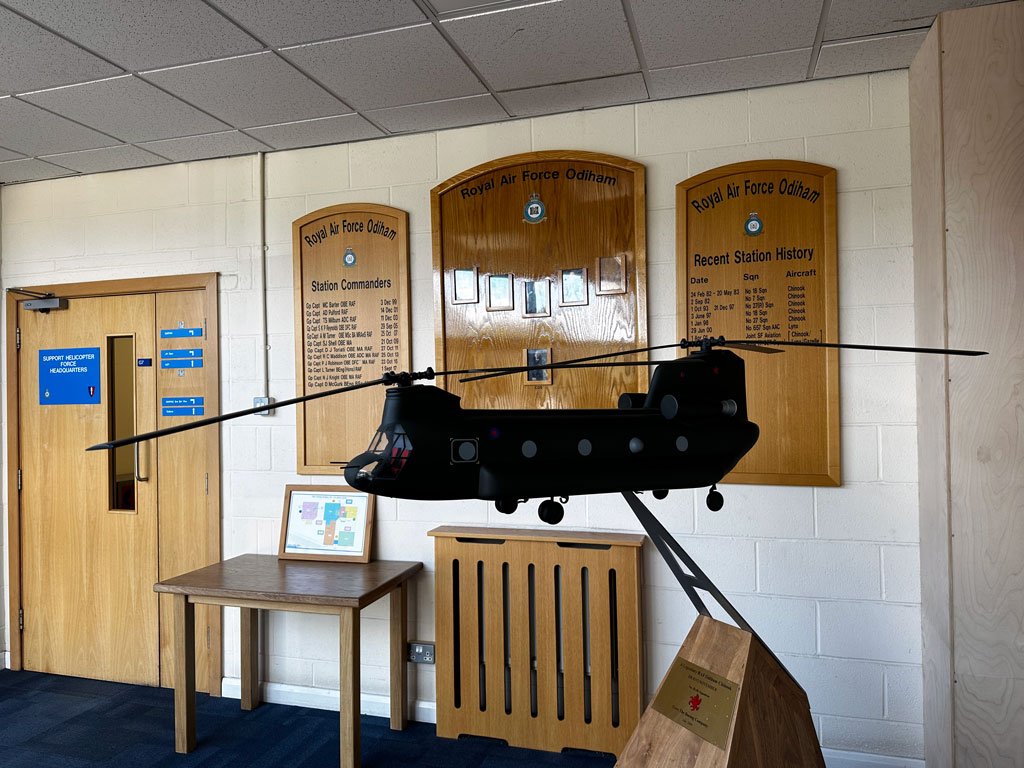Odiham is a relatively sleepy village in North Hampshire. It prides itself as having changed little in 100 years or more. But just a stone’s throw to the south of Odiham is a famous Royal Air Force base, home to the mighty Chinook Helicopter and home for the past two years to Group Captain Donal McGurk, Plane Speaking’s next guest for Flight Training News.

Arranging this meeting proved a challenge and three appointments were cancelled and rescheduled before I was able to finally pin this very busy Station Commander down. Donal is approaching the end of his two-year tenure at RAF Odiham. Station Commanders are only permitted to remain in position for a maximum of two years and it’s rare to be offered a second posting. Donal moves on this month.
As Donal explained, “this is probably the best job in the RAF. Running a front-line Royal Air-Force station has been the pinnacle of my career and one whose memory I will forever cherish.”
RAF Odiham has some 1700 people working on its 650 acre site and Donal mused that his role is rather like a Mayor; the Mayor of RAF Odiham. Almost everything that happens in the civilian world is mirrored on the RAF Station, and his job is to ensure the station works efficiently and happily.
A brief look at RAF Odiham’s history is interesting. The first aircraft flew from Odiham in 1925 and in October, 1937 it officially opened as an airfield. During World War 2, North American Mustangs and Hawker Typhoons were flown from the base. It was also home to the Hawker Hector, Westland Lysander, Spitfire, Bristol Blenheim and the De Havilland Mosquito.
Once the war was over, RAF Odiham saw the arrival of the jet with Vampires and Meteors, Hunters and Javelins flying into the Hampshire base. As a fighter base, RAF Odiham closed in 1959. In 1960, the base reopened, but then as part of Transport Command and home to the Belvedere Helicopter, followed by the Westland Whirlwind in 1964 and Aerospatiale Puma in 1971.
It wasn’t until 1981 that the first Chinook wafted its massive blades across the Odiham countryside, an aircraft that is now synonymous with this historic airfield. The sound from the Chinook’s rotor blades is unmistakeable and comforting. It was in 2015 that the Chinook Operational Conversion Flight comprising six Chinooks and 150 personnel would transfer from Odiham to RAF Benson to form a joint Chinook/Puma Operational Conversion Unit. It is at Benson that future crews learn to fly the Chinook.
The Chinook is a very capable, versatile support helicopter which can be operated from land and from ships. It has a triple-hook external load system, internal cargo winch, roller conveyor fit which enables it to carry both underslung and internal freight and up to 55 troops or 10 tonnes of mixed cargo.

Two years ago (2021), the runways at RAF Odiham were upgraded to extend the airfield’s life by another 15 years and today, its mission statement is simple and one of which the base is proud: To Deliver and sustain Chinook and Special Forces aviation operations world-wide, in order to support UK defence missions and tasks.
Donal McGurk is a man of medium build, medium height and looks younger than his 51 years. Born in Gibraltar but brought up in Oxfordshire, Donal likes to keep fit. There was a cycling helmet on his desk when I arrived and he is a keen runner, having completed 9 marathons. His best time was 3 hrs and 12 minutes which, as any runner knows, is seriously impressive. Donal is also a keen guitarist, playing blues and acoustics. The press photograph of the Group Captain belies his true personality which is welcoming and warm but nonetheless serious. As I was shown into his office, he enthusiastically sprung from his desk with a welcome which made me feel immediately at ease.
Donal had done the standard Maths, Physics and Chemistry at school before going to Warwick University to study Civil Engineering. At this stage, the RAF had not been seriously considered as a career. Donal’s father had been in the Royal Air Force although not Aircrew and had taken the young Donal to a number of air shows. However, it was a Career Fair that made his mind up to join the RAF at the age of 22. It was 1994. Donal had originally been accepted as a Pilot in selection, but government cutbacks meant he was to be trained as a Navigator.
“My engineering degree was useful,” he explained “and gave me the numeracy and maturity my early days in the air force required.” He does not regret studying for a degree before joining up.
Donal trained first as a helicopter Navigator at RAF Shawbury and his first operational posting was to No 72 Squadron on the Wessex HC2 in the Support Helicopter role in Northern Ireland.
Just 8 years later, Donal had been promoted to Squadron Leader. He was now just 30 and, after a short ground tour, returned to flying the Sea King as Officer Commanding E Flight, 202 Squadron which was a detached Search and Rescue Flight based in East Yorkshire. Following this, he was promoted to Wing Commander and posted to HQ Joint Helicopter Command as the Air Safety Manager and then to the Advanced Command and Staff Course at Shrivenham. Following further promotion he then went to the MOD Main Building where he became Deputy Head of Planning in the Strategy Directorate.
In August 2021 and 27 years after joining the Air Force, Group Captain McGurk took the reins of RAF Odiham, home to the mighty 24 ton Chinook. This posting had been Donal’s dream.
“The Chinook is an amazing machine” Donal explained and the Station Commander’s role, “an enormous responsibility.” During any civilian disaster or military operation, requiring the capabilities of the Chinook, the Station Commander must ensure RAF Odiham is up to the task. “In the last two years, there has been constant ‘crisis management’ with detachments to the Sudan, Mali, Lithuania, Estonia and Eastern Europe, amongst many other countries, not forgetting Covid and flooding. Wherever heavy lift capability is required, the Chinook will find itself called upon.”
The Station Commander’s role clearly requires careful delegation. As such, there are, in fact, three Chinook Squadrons working from Odiham; No 7, No 18(B) and No 27 Squadrons, each with subtly different roles. With No 18(B) and 27 Sqn supporting the Royal Navy and British Army and No 7 squadron who support the United Kingdom’s Special Forces.
In addition, RAF Odiham is home to the Chinook Display team.
Which Squadron a new Chinook pilot finds himself posted to depends on several factors, but in general, younger crews tend to volunteer for No 7 Squadron and the more mature or married crews will be posted to the other two squadrons. There are Aircrew in their late 20s and Aircrew in their 50’s. The Chinooks from Odiham, together with the Puma helicopters from RAF Benson, make up the RAF’s ‘Support Helicopter Force’.
Donal explained that the Station Commander has five main roles. He is responsible for the preparedness and the training of all the Station’s personnel. He is accountable for safety. He is responsible for discipline on the site and responsible for the integration of new models of Chinook as they enter service. Of the 1700 personnel, some 220 are Aircrew and over 600 are Engineers. The Squadrons can literally deploy anywhere, at any time, and be self-sufficient.
Today, some 57 Chinooks are based at Odiham, with heavy maintenance being carried out at Gosport. There is a low staff attrition rate at Odiham. Just 12 to 16 new Aircrew join this Station each year. Initial helicopter training takes place at RAF Shawbury, before Pilots are posted to RAF Benson for type conversion. Three Chinook full-motion simulators are available at Benson managed by CAE and ex Chinook Aircrew.
Donal explains that he feels it’s essential to be a team player. As if to prove it, there are even pictures of him competing in a tug of war on the airfield! Donal, himself has experienced work in most departments on the base, including maintenance, and he aims to fly at least two to three times a month. When he’s in the cockpit, he is just a crew member doing a job. The Station Commander’s hat is left on the desk. He often deploys to where the helicopters are operating. “It’s important to understand each operation and ensure they are getting the support they need.”
“The Royal Air Force is maturing,” Donal explained “there’s a much better gender balance than there was thirty years ago and the sense of being a meritocracy is strong. People are promoted on their ability. “We try to work also with the local communities, including an annual Remembrance flypast down Odiham’s packed high street and landing a Chinook at the annual tea party, raising money for charities and local events.” Noise complaints are very rare. “The Odiham locals are proud of their association with the RAF Station.”
Would he encourage his own children to join the Royal Air Force? “Yes, it’s a great career with amazing opportunities.” Donal confirmed the Royal Air Force is changing, and generally for the better.
Apart from his running, cycling, and commanding a busy RAF Station, Donal is two thirds of the way through a Masters Degree in Mathematics. His life is clearly very full and like most of the people I’ve met on Plane Speaking, he fits the role perfectly and was clearly an obvious choice for the job.
Sadly, Donal’s two years as Station Commander are almost up and in a month’s time, his office will no longer be looking over a beautiful aerodrome or the Hampshire countryside beyond, but instead he will again be working at MOD Main Building.
During the time your father was in the Royal Air Force, which postings did you most enjoy? Did you miss the stability of home life in one location?
My dad left the RAF when I was only 1 year old so service life never noticeably affected me.
Did you have brothers or sisters? Did any follow you into a military career?
I have a brother and a sister – both of whom are much more creative than I am. My brother is a Music Teacher and my sister is an Art Teaching Assistant.
What rank did your father achieve and did he live to see your success in the RAF?
My father was a corporal and he loved all of the things I did in the RAF. I remember him joking about a deployment to Afghanistan that he thought he should have gone instead of me. He died only 6 weeks after I took command at Odiham.
Were your parents supportive of your plan to join the RAF or would they have preferred you to continue as an engineer?
Yes, they were supportive although my mother worried, as most do!
What advice would you give anyone joining the Royal Air Force today? Degree first or join asap?
I loved my time at University and would recommend that to anyone, but in terms of a career in the RAF you are probably better off joining earlier rather than later.
The Chinook has two Aircrew. If the pilot became incapacitated, is the second crew member qualified to fly the aircraft?
Yes, and thankfully for me as a navigator, the Chinook is relative straightforward to fly. The real skill is in fully exploiting and operating the aircraft in demanding conditions as a 4-person crew.
You have the letters BSc and MA after your name. I recall you are doing a Masters in Mathematics, what was the other MA you hold?
Degree in Civil engineering, Degree in Physics (through the Open University over about 10 years!), Masters in Defence Studies (through KCL), but I haven’t finished my Masters’ in Mathematics (2 modules to go).
Is the Royal Air Force influenced by qualifications? Does promotion depend upon it?
External qualifications do not really affect the RAF (beyond minimum entry standards). The MA in Defence Studies I completed while at Staff College; the Staff College syllabus overlaps about 75% with the KCL (who deliver the academic elements of the course) MA Defence Studies syllabus – and so if you do the additional units, essays and exam you can qualify for their MA.
What age do you foresee retiring from the Royal Air Force? Would you plan to retire properly or enter a civilian position?
I have a contract until age 60 and my wife definitely won’t let me retire until she does.
When you realised you could not be a pilot, did you consider not continuing in the Royal Air Force?
No, I was excited enough by the opportunities as they appeared at that time and I have been lucky enough to do lots of amazing and varied things.
Do you feel the perception of life in the Royal Air Force is an accurate one?
Life in the RAF has been very different from what I expected, probably because I grew up in the Cold War and that formed all of my perceptions and was the experience of all the people who trained me early on.
What one attribute if you could separate it, do you have which has helped your success as a Station Commander?
Calmness under pressure.
Looking back on the two years at Odiham, which event gives you the most pleasure remembering?
The Station’s reaction to crises – and there have been too many to separate just one – but probably the rapid deployment to Eastern Europe (with the Apache Force) to provide NATO presence on the eve of, and during, Russia’s invasion of Ukraine.
Yes, he will miss RAF Odiham, the people, the aircraft, the role and the excitement but he is grateful to have had this amazing, once in a life-time opportunity. Looking back on his career, his memories of being a Flight Commander on a front-line Squadron took some beating, but being a Station Commander has been a challenge and an experience which will probably spoil any future role which Group Captain McGurk finds himself doing.
He wouldn’t have missed it for the world.
© David Hoy


